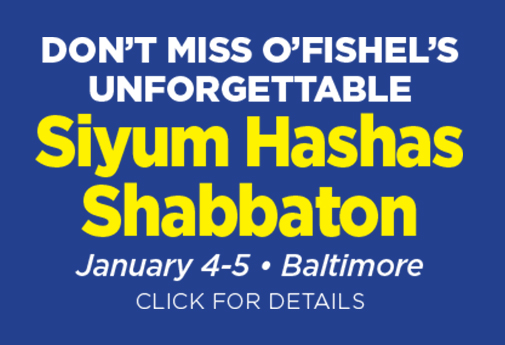Proper Protesting
[Editor’s note: As a memory of my beloved brother Shaya, I would like to continue sending out his pearls of wisdom that he has shared with all of you in the past. For some of you this may ring a bell and for others it may appear to be totally new. May the learning of Shaya’s Divrei Torah inspire us to change our ways and thereby give an Aliya to the neshama of our dear beloved Shaya whom we miss so much.]
The Medrash says that when Iyov heard that the two sons of Aharon died, he became very frightened. Why?
Chazal explain that Iyov was afflicted with suffering because when he was an advisor to Pharoh, Iyov did not protest to Pharoh’s decision to throw the Jewish babies into the river. Chazal also say that Nadav and Aveehoo were punished because of the following incident: when Moshe & Aharon were walking, followed by Nadav and Aveehoo, Nadav turned to Aveehoo & asked ‘when will these two elders [Moshe & Aharon] die, and we will finally be able to take over as leaders of Klal Yisroel?’
Of course there is a deep understanding for why Nadav said what he said, and it wasn’t a petty lust for power, but either way, why was AVEEHOO punished? He didn’t say anything, he just kept quiet!?
We can learn from Aveehoo a very important lesson, which is that if someone sees his friend doing something wrong, being quiet isn’t good enough; he is obligated to protest. Since Aveehoo didn’t protest, it was as if he did the same action as Nadav, and Aveehoo was therefore also killed.
So when Iyov heard that the two sons of Aharon died [not just Nadav but Aveehoo also], he understood this concept; silence is admission, and remaining quiet does not suffice. Therefore, he feared that he, too, would be punished because he also had just been quiet and hadn’t protested to Pharoh’s decision. And that is what ultimately happened to Iyov.
I am not citing this Dvar Torah to say that we should jump at every opportunity to protest and attend every rally under the sun! We should follow Daas Torah when to attend rallies and protests and when not to. But, if we are in a situation where we know protesting a friend or colleague’s improper actions will be under the guidelines set forth by the Torah for when one should protest or give rebuke, let us gather the strength not to be quiet [and certainly not to laugh or encourage], but to speak out firmly for the sake of the glory of Hashem.
{Editor’s note:There was once a Yerushalmi Yid walking down a street on Shabbos, and a car driven by a Jew passed by. Someone walking behind him heard him say something to himself as the car whizzed past. The curious person inched closer to the Yerushalmi as another car approached and heard the Yid whisper two words… “Shabbos, Shabbos!”
Such a powerful story!
(This is a beautiful story that I heard a while ago. If someone knows the origin of the story please email me at zichronshaya@gmail.com. Thanks!)
I thought of two lessons that we could learn from this story.
First is that so many times people get caught up in the heat of the moment and give rebuke/ protest loudly saying “you are wrong!” and “this is not how you are supposed to act!” They become so caught up in the moment that they often lose sight of the bigger picture, failing to express their point to the other person involved in the argument.
This Yerushalmi Yid, however, did nothing of this sort. He made a quiet protest that didn’t affect the person driving the car, and therefore didn’t create any machlokes.
Another lesson that I think could be learned from this story is that this Yerushalmi Yid felt it necessary to utter the words Shabbos every time a car passed him. He felt it necessary EVERY time to remind himself of the fact that it is Shabbos. He didn’t just say to himself “Unfortunately that’s how things are…” How many times do we see someone desecrating Shabbos or any one of the other Mizvohs and let it slide. By letting it slide we are telling ourselves that this Aveirah is not so bad, which leads us to have a lower appreciation for what is holy. By reminding ourselves that Mitzvos are precious, we can avoid becoming desensitized and retain our values.
If you think of other lessons from this story, I would love to hear them.
Have an amazing Shabbos!}
To be added to the weekly Dvar Torah list please email zichronshaya@gmail.com



